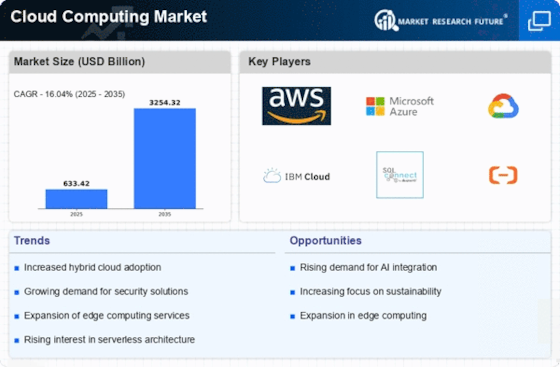Top Industry Leaders in the Cloud Computing Market

Competitive Landscape of the Cloud Computing Market
The cloud computing market is a rapidly growing and highly competitive landscape, with established giants vying for market share against innovative newcomers. This dynamic market presents a plethora of options for businesses seeking to leverage the scalability, agility, and cost-effectiveness of cloud-based solutions.
Key Players:
- com Inc
- Microsoft Corporation
- Alphabet Inc
- Oracle Corporation
- com Inc.
- VMware Inci
- IBM Corporation Ltd
- Alibaba Group Holding
- Dell EMC Corp.
- Rackspace inc
- Adobe Systems Inc.
- SAS Institute Inc
- TIBCO Software Inc
Strategies Adopted by Key Players:
- Amazon Web Services (AWS): The undisputed leader in the cloud computing market, holding a significant market share. AWS offers a comprehensive suite of services including Infrastructure as a Service (IaaS), Platform as a Service (PaaS), and Software as a Service (SaaS).
- Microsoft Azure: Microsoft's cloud platform, Azure, is a strong competitor to AWS, especially with its close integration with Microsoft's existing software and services. Azure excels in hybrid cloud solutions, catering to businesses already heavily invested in the Microsoft ecosystem.
- Google Cloud Platform (GCP): Google's cloud offering, GCP, focuses on innovation and cutting-edge technology, boasting strong capabilities in artificial intelligence (AI), machine learning (ML), and data analytics. GCP caters to businesses seeking advanced technological solutions.
- Alibaba Cloud: Dominating the Chinese market, Alibaba Cloud is a significant force in the global landscape. Its expertise in e-commerce and large-scale computing makes it a compelling choice for businesses operating in the Asia-Pacific region.
- IBM Cloud: Leveraging its deep expertise in enterprise technology, IBM Cloud offers specialized solutions for various industries, including finance, healthcare, and manufacturing.
Market Share Analysis Factors:
- Revenue: The most common metric for measuring market share is total annual revenue generated from cloud services.
- Customer base: The size and diversity of a cloud provider's customer base can significantly impact its market share.
- Service offerings: The breadth and depth of a provider's service portfolio, including IaaS, PaaS, and SaaS, plays a crucial role in market share analysis.
- Geographic presence: The global reach and availability of cloud services across different regions contribute to market share.
- Innovation: Continuous investment in research and development and the ability to offer cutting-edge technology can attract customers and increase market share.
New and Emerging Companies:
Several new and emerging companies are disrupting the cloud computing market with innovative offerings and niche specializations. Some notable examples include:
- DigitalOcean: Simplifies cloud hosting for developers, especially small and medium-sized businesses.
- Linode: Offers a high-performance, affordable cloud platform with a strong focus on Linux containers.
- Vultr: Provides high-performance cloud servers with global availability at competitive prices.
- Hetzner: Offers a German-based cloud platform with a strong focus on data privacy and security.
- Cloudflare: Primarily known for its content delivery network (CDN), Cloudflare is expanding its cloud offerings, including serverless computing and edge computing solutions.
Current Company Investment Trends:
- AI and ML: Cloud providers are heavily investing in AI and ML capabilities, offering pre-trained models and AI-powered tools to enable businesses to leverage these technologies.
- Hybrid cloud: As businesses seek to bridge the gap between on-premises infrastructure and the cloud, hybrid cloud solutions are gaining traction, prompting investments in seamless integration and management capabilities.
- Security and compliance: With increasing concerns about data privacy and security, cloud providers are investing heavily in robust security measures and compliance certifications to address customer needs.
- Sustainability: Environmental considerations are driving investments in renewable energy sources and energy-efficient data centers by cloud providers.
- Industry-specific solutions: Cloud providers are tailoring their offerings to address the specific needs and challenges of various industries, such as healthcare, finance, and retail.
Latest Company Updates:
February 14, 2023
Akamai Technologies, the cloud provider that powers and safeguards life online, today unveiled three cloud computing facilities that will be operational by 2023. These facilities realise Akamai's vision for a new type of cloud that will better serve the needs of contemporary applications that demand higher performance, lower latency, and true global scalability than current cloud architectures can offer.
The Federal Trade Commission (FTC) began an investigation into company practises and how they affect competition in the cloud computing sector on March 22. Regulators in the United Kingdom (UK) have started an investigation into possibly anticompetitive aspects of the cloud market, and European regulators have also started looking into the market for cloud services.
A new set of componentized, composable cloud native services called Oracle Banking Cloud Services was introduced in 2023 by Oracle, a US-based cloud technology corporation. With the help of the six new services, banks are now able to process scalable corporate demand deposit accounts, manage enterprise-wide limits and collateral, handle real-time ISO20022 international payments, control APIs, sign up and originate retail clients, and develop fresh digital self-service experiences. They are designed on a microservices architecture, which helps banks update and modernise their business capabilities more quickly and reliably.










